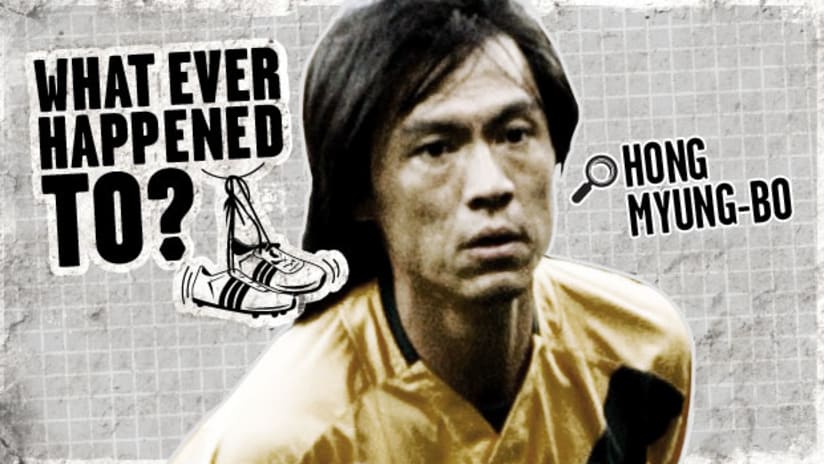MLSsoccer.com continues its look back at the stars, personalities and cult heroes who made Major League Soccer what it is today. Our fourth annual “What Ever Happened To..." series rolls on with Hong Myung-Bo, briefly an LA Galaxy defender and the first Korean ever to play in MLS. (Check out more from the series here.)
Where He Was Then
Korean players enjoyed something of a coming-out party on the world stage after their semifinal run at the 2002 World Cup and Hong was no exception. After captaining the Taeguk Warriors to a historic finish on their home turf, the accomplished defender was expected to follow his countrymen to European leagues. He did not.
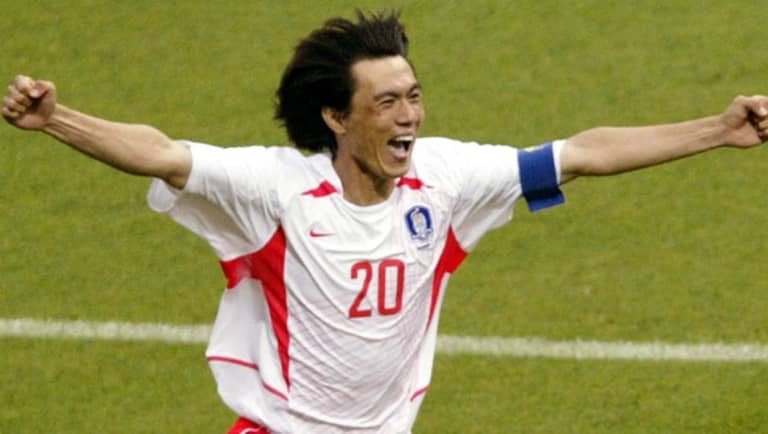
Hong elected to sign with the LA Galaxy just weeks after they won that year's MLS Cup, becoming the first Korean to join Major League Soccer. If it were any other player, such a move would have been criticized by the media. Hong’s stature and achievements ensured that he was not.
“The Eternal Libero” had a memorable debut season in 2003, to the excitement of Southern California’s sizeable Korean community, making 25 appearances for Sigi Schmid (and somewhat surprisingly supplanting Alexi Lalas in the lineup). Injuries limited his activity the following year, and Hong called it quits at the end of the 2004 season. But his greatest act may be yet to come in Brazil this summer.
Where He Is Now
There was never any doubt that Hong would become a leader of some sort in soccer, whether it was in the field of coaching, operation or administration.
Renowned as a great organizer and possessing considerable leadership skills, he was Guus Hiddink’s on-field lieutenant at Korea/Japan 2002. The world may remember him for scoring the match-winning penalty kick against Spain in Gwangju in the quarterfinals, and he was already approaching legendary status. After all, that was his fourth World Cup.
What They Said
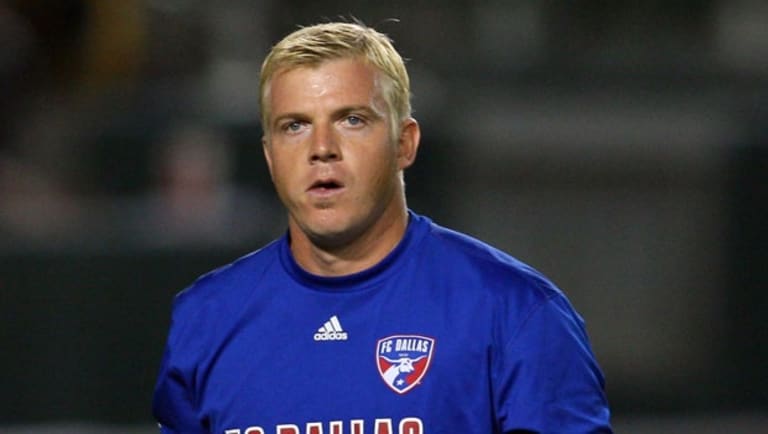
"Knowing where he came from and the level he was playing at, we were all intrigued when he came in – I mean, Pelé named the guy to his list of the 100 greatest players of all time. But he was able to slide right in and provided consistency in the middle.
“He was an experienced back who really knew how to play off the other guy’s shoulder and when to drop off and use his physical attributes. He did a wonderful job reading the game.
"He and Alexi were battling for playing time, but it was never about any animosity – the guy really made a point of showing he cared about his teammates despite his lack of English.”
– Kevin Hartman, LA Galaxy teammate
His Los Angeles move was his last as a player, though many felt that he could have played for a few seasons more (the national team still hasn’t replaced him). But it may have help prime him for what was ahead.
“Going to LA was a great experience for me,” he said in an interview before the 2012 Olympics. “Playing in California among so many different cultures was very interesting and it is a unique sporting market that has its own atmosphere. It was a good place to finish playing and it made me think about what to do next.”
Despite plans to stay Stateside to study for an MBA, he was distracted, like many students before him, by a job offer too good to refuse. In the fall of 2005, Dick Advocaat arrived in Korea to take control of a team preparing for the 2006 World Cup, and one of his first acts as national team coach was to ask the 2002 skipper to join his coaching staff.
“I was a player under Hiddink and it was a great time, but I didn’t get a chance to see how it all works,” said Hong. “But from Advocaat, I learned how to see everything, hear everything and be involved in everything. From other coaches I worked with, I learned specific things but under Advocaat, I began to see the whole picture.”
Initially, he was a link between the staff and the team he had retired from just three years previously, but his role grew. Thanks to his time with the Galaxy, his English had improved to the extent that he was able to participate in tactical discussions with the rest of the staff.
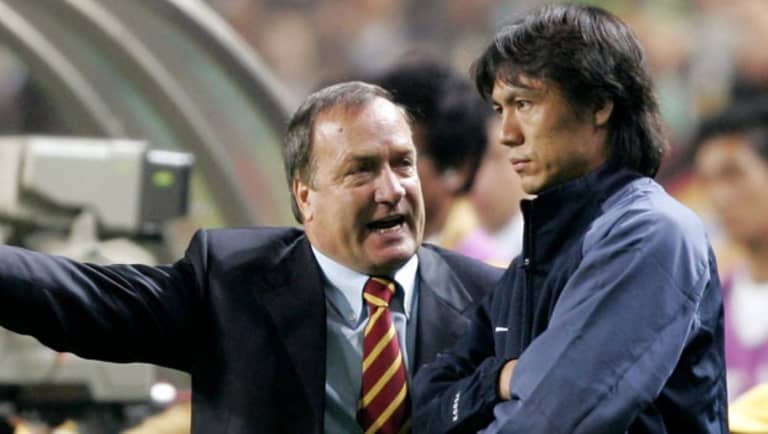
Hong's coaching education came under a long line of successful Dutch managers, including Dick Advocaat, to whom he served as an assistant at the 2006 World Cup.
(REUTERS)
After Advocaat departed in July 2006, Hong stayed on to assist Pim Verbeek, another Dutchman and assistant to both Advocaat in ’06 and Hiddink in ’02.
Hong helped prepare the team for the 2006 Asian Games and the ’07 Asian Cup. His last act as part of Verbeek’s staff was to be sent off from the sidelines in a playoff game against Japan for abusing the referee for sending off a Korean player. It was a rare expression of emotion usually hidden underneath a steely exterior. And perhaps a sign that he was adapting to the sidelines.
“The Dutch coaches I worked with all had similar basic beliefs but emphasized different aspects of the game,” Hong said. “It [put] me in good stead when I was ready to take control of my own team and I was ready for a new challenge.”
And that came from a familiar face in Hiddink, who made Hong his assistant coach in 2013 at Russian club Anzhi Makhachkala, thus completing his progression from lieutenant in 2002 to second-in-command 11 years later. It was something he sought out as part of his desire to improve, saying at the time that it would “help me evolve to another tier as a manager.”
In the meantime, Hong was working his way up the food chain within his home federation. In 2009, he became the coach of South Korea’s Under-20 team with a long-term eye on qualifying that group of players for the 2012 Olympics. The theory was that the team would grow together under Hong just in time for London.
It worked across the board. Hong led his team to the last eight of the 2009 U-20 World Cup, narrowly losing to eventual champions Ghana. In London three years later, his U-23 side made it to the knockout round of the Olympic tournament, where they eliminated hosts Great Britain in front of 80,000 fans in Cardiff on their way to a bronze-medal finish.
And Hong won his public over even more in the bronze-medal game. It wasn’t just the 2-0 victory over bitter rivals Japan, which was nice. It was the simple show of compassion. Olympic participation also means a military exemption for Korean players, who otherwise would have to interrupt their careers for two years before they turn 30 to serve in the country's armed forces. With his players needing to get on the field to gain the exemption, Hong showed his caring side by leaving a slot available for the previously unused Kim Kee-Hee to come on in the last minute.
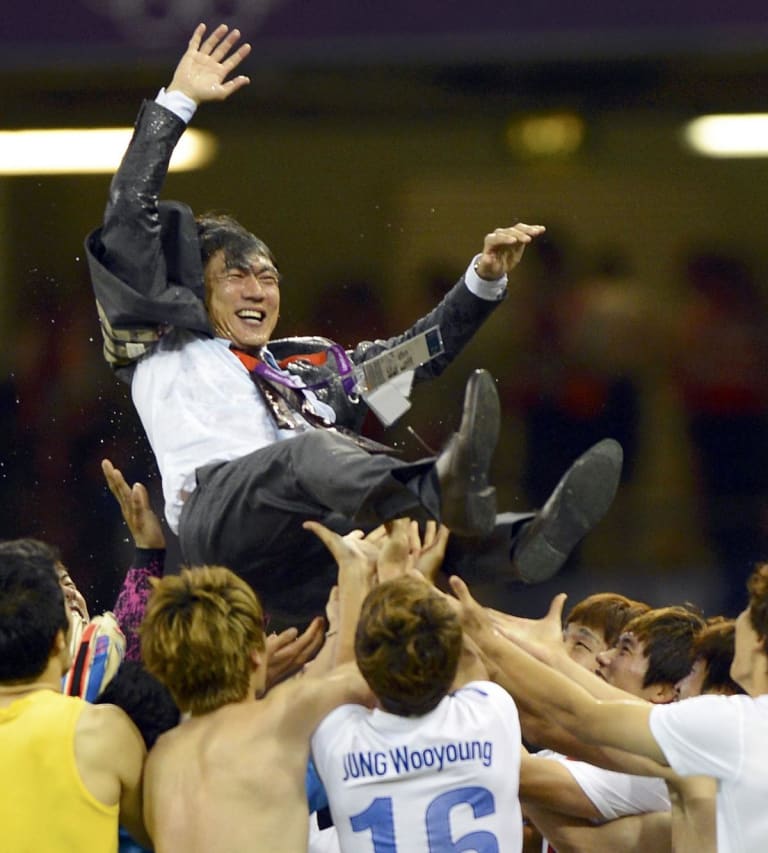
Says former South Korea coach Pim Verbeek: "When I saw Korea at the 2012 Olympics, I saw parts of the match that looked very much the way the Dutch like to play – building up from the back, high pressure when losing the ball, ball possession, patience."
(REUTERS)
The team returned home as heroes and Hong’s reputation was enhanced even further. Just as Hiddink did in his 18 months in East Asia, Hong created a national team with a club-like atmosphere. He won respect among all the K-League clubs and as much support as possible from the Korean FA.
Here was the first Korean coach with a genuinely international background, much more in tune with the thoughts and desires of the young generation of players than the older coaches that had gone before. The players idolized him, partly because of who he was and what he had done but also because of his leadership qualities, a quiet but steely calm, approachable, at least in Korean terms, but still an unquestioned leader.
It came as no surprise that he became senior national team coach in July 2013 after an uninspired World Cup qualification campaign under his predecessor, Choi Kang-Hee. With less than 12 months’ preparation time before the big kickoff, Hong is trying to bring the same touch of magic to the senior side.
The long-ball and predictable tactics under Choi have gone, or are going, and this is a faster, more aggressive and “more Korean” team. Hong will get the chance to show off his chops (albeit with something of a “B” team) when he leads Korea Republic into StubHub Center for Saturday’s friendly against the US national team, a Los Angeles homecoming for Hong in his old Galaxy stomping grounds.
It’s still a work in progress and time is short before Hong’s men open the World Cup against Russia in Cuiabá on June 17. But Korean fans still believe that if there is one man who can do it, it’s “the Eternal Libero.”
"It is a great honor and responsibility to become head coach of South Korea and I am ready to work as hard as possible to bring success to the national team," Hong said in his introductory press conference last summer. "It's not just about the World Cup, but about building for the future, and that starts now."

